- Home
- Elizabeth George
The Best American Mystery Stories 2016 Page 3
The Best American Mystery Stories 2016 Read online
Page 3
“He was only thirty-five.”
“That’s so sad,” Penny said, finding her eyes misting, the liquor starting to tell on her.
“His bookstore is still on Cahuenga Boulevard,” Benny told her. “He was so proud when it opened.”
“Before that he sold books for Stanley Rose,” Mr. Flant added, sliding a handkerchief from under the cuff of his fraying sleeve. “Larry was very popular. Very attractive. An accent soft as a Carolina pine.”
“He’d pronounce bed like bay-ed.” Benny grinned, leaning against the windowsill and smiling that Gable smile. “And he said bay-ed a lot.”
“I met him even before he got the job with Stanley,” Mr. Flant said, voice speeding up. “Long before Benny.”
Benny shrugged, topping off everyone’s drinks.
“He was selling books out of the trunk of his old Ford,” Mr. Flant continued. “That’s where I first bought Ulysses.”
Benny grinned again. “He sold me my first Tijuana Bible. Dagwood Has a Family Party.”
Mr. Flant nodded, laughed. “Popeye in The Art of Love. It staggered me. He had an uncanny sense. He knew just what you wanted.”
They explained that Mr. Rose, whose bookstore had once graced Hollywood Boulevard and had attracted great talents, used to send young Larry to the studios with a suitcase full of books. His job was to trap and mount the big shots. Show them the goods, sell them books by the yard, art books they could show off in their offices, dirty books they could hide in their big gold safes.
Penny nodded. She was thinking about the special books Mr. D. kept in his office, behind the false encyclopedia fronts. The books had pictures of girls doing things with long, fuzzy fans and peacock feathers, a leather crop.
She wondered if Larry had sold them to him.
“To get to those guys, he had to climb the satin rope,” Benny said. “The studio secretaries, the script girls, the publicity office, even makeup girls like you. Hell, the grips. He loved a sexy grip.”
“This town can make a whore out of anyone,” Penny found herself blurting.
She covered her mouth, ashamed, but both men just laughed.
Mr. Flant looked out the window into the courtyard, the flip-flipping of banana leaves against the shutter. “I think he loved the actresses the most, famous or not.”
“He said he liked the feel of a woman’s skin in bay-ed,” Benny said, rubbing his left arm, his eyes turning dark, soft. “Course, he’d slept with his mammy until he was thirteen.”
As she walked back to her own bungalow, she always had the strange feeling she might see Larry. That he might emerge behind the rosebushes or around the statue of Venus.
Once she looked down into the fountain basin and thought she could see his face instead of her own.
But she didn’t even know what he looked like.
Back in the bungalow, head fuzzy and the canyon so quiet, she thought about him more. The furniture, its fashion at least two decades past, seemed surely the same furniture he’d known. Her hands on the smooth bands of the rattan sofa. Her feet, her toes on the banana silk tassels of the rug. And the old mirror in the bathroom, its tiny black pocks.
In the late hours, lying on the bed, the mattress too soft, with a vague smell of mildew, she found herself waking again and again, each time with a start.
It always began with her eyes stinging, dreaming again of a doctor with the head mirror, or a car careering toward her on the highway, always lights in her face.
One night she caught the lights moving, her eyes landing on the far wall, the baseboards.
For several moments she’d see the light spots, fuzzed and floating, as if strung together by the thinnest of threads.
The spots began to look like the darting mice that sometimes snuck inside her childhood home. She never knew mice could be that fast. So fast that if she blinked, she’d miss them, until more came. Was that what it was?
If she squinted hard, they even looked like little men. Could it be mice on their hind feet?
The next morning she set traps.
“I’m sorry, he’s unavailable,” the receptionist said. Even over the phone, Penny knew which one. The beauty marks and giraffe neck.
“But listen,” Penny said, “it’s not like he thinks. I’m just calling about the check he gave me. The bank stopped payment on it.”
So much for Mr. D.’s parting gift for their time together. She was going to use it to make rent, to buy a new girdle, maybe even a television set.
“I’ve passed along your messages, Miss Smith. That’s really all I can do.”
“Well, that’s not all I can do,” Penny said, her voice trembling. “You tell him that.”
Keeping busy was the only balm. At work it was easy, the crush of people, the noise and personality of the crew.
Nights were when the bad thoughts came, and she knew she shouldn’t let them.
In the past she’d had those greasy-skinned roommates to drown out thinking. They all had rashes from cheap studio makeup and the clap from cheap studio men and beautiful figures like Penny’s own. And they never stopped talking, twirling their hair in curlers and licking their fingers to turn the magazine pages. But their chatter-chatter-chatter muffled all Penny’s thoughts. And the whole atmosphere—the thick muzz of Woolworth’s face powder and nylon nighties when they even shared a bed—made everything seem cheap and lively and dumb and easy and light.
Here, in the bungalow, after leaving Mr. Flant and Benny to drift off into their applejack dreams, Penny had only herself. And the books.
Late into the night, waiting for the light spots to come, she found her eyes wouldn’t shut. They started twitching all the time, and maybe it was the night jasmine, or the beach burr.
But she had the books. All those books, these beautiful, brittling books, books that made her feel things, made her long to go places and see things—the River Liffey and Paris, France.
And then there were those in the wrappers, the brown paper soft at the creases, the white baker string slightly fraying.
Her favorite was about a detective recovering stolen jewels from an unlikely hiding spot.
But there was one that frightened her. About a farmer’s daughter who fell asleep each night on a bed of hay. And in the night the hay came alive, poking and stabbing at her.
It was supposed to be funny, but it gave Penny bad dreams.
“Well, she was in love with Larry,” Mr. Flant said. “But she was not Larry’s kind.”
Penny had been telling them how Mrs. Stahl had shown up at her door the night before, in worn satin pajamas and cold cream, to scold her for moving furniture around.
“I don’t even know how she saw,” Penny said. “I just pushed the bed away from the wall.”
She had lied, telling Mrs. Stahl she could hear the oven damper popping at night. She was afraid to tell her about the shadows and lights and other things that made no sense in daytime. Like the mice moving behind the wall on hind feet, so agile she’d come to think of them as pixies, dwarves. Little men.
“It’s not your place to move things,” Mrs. Stahl had said, quite loudly, and for a moment Penny thought the woman might cry.
“That’s all his furniture, you know,” Benny said. “Larry’s. Down to the forks and spoons.”
Penny felt her teeth rattle slightly in her mouth.
“He gave her books she liked,” Benny added. “Stiff British stuff he teased her about. Charmed himself out of the rent for months.”
“When he died she wailed around the courtyard for weeks,” Mr. Flant recalled. “She wanted to scatter the ashes into the canyon.”
“But his people came instead,” Benny said. “Came on a train all the way from Carolina. A man and woman with cardboard suitcases packed with pimento sandwiches. They took the body home.”
“They said Hollywood had killed him.”
Benny shook his head, smiled that tobacco-toothed smile of his. “They always say that.”
“You’re awfully pretty for a fa
ce-fixer,” one of the actors told her, fingers wagging beneath his long makeup bib.
Penny only smiled, and scooted before the pinch came.
It was a western, so it was mostly men, whiskers, lip bristle, three-day beards filled with dust.
Painting the girls’ faces was harder. They all had ideas of how they wanted it. They were hard girls, striving to get to Paramount, to MGM. Or they’d started out there and hit the Republic rung on the long slide down. To Allied, AIP. Then studios no one ever heard of, operating out of some slick guy’s house in the Valley.
They had bad teeth and head lice and some had smells on them when they came to the studio, like they hadn’t washed properly. The costume assistants always pinched their noses behind their backs.
It was a rough town for pretty girls. The only place it was.
Penny knew she had lost her shine long ago. Many men had rubbed it off, shimmy by shimmy.
But it was just as well, and she’d just as soon be in the war-paint business. When it rubbed off the girls, she could just get out her brushes, her powder puffs, and shine them up like new.
As she tapped the powder pots, though, her mind would wander. She began thinking about Larry bounding through the back lots. Would he have come to Republic with his wares? Maybe. Would he have soft-soaped her, hoping her bosses might have a taste for T. S. Eliot or a French deck?
By day she imagined him as a charmer, a cheery, silver-tongued roué.
But at night, back at the Canyon Arms, it was different.
You see, sometimes she thought she could see him moving, room to room, his face pale, his trousers soiled. Drinking and crying over someone, something, whatever he’d lost that he was sure wasn’t ever coming back.
There were sounds now. Sounds to go with the 2 a.m. lights, or the mice or whatever they were.
Tap-tap-tap.
At first she thought she was only hearing the banana trees brushing against the side of the bungalow. Peering out the window, the moon-filled courtyard, she couldn’t tell. The air looked very still.
Maybe, she thought, it’s the fan palms outside the kitchen window, so much lush foliage everywhere, just the thing she’d loved, but now it seemed to be touching her constantly, closing in.
And she didn’t like to go into the kitchen at night. The white tile glowed eerily, reminded her of something. The wide expanse of Mr. D.’s belly, his shirt pushed up, his watch chain hanging. The coaster of milk she left for the cat the morning she ran away from home. For Hollywood.
The mousetraps never caught anything. Every morning, after the rumpled sleep and all the flits and flickers along the wall, she moved them to different places. She looked for signs.
She never saw any.
One night, 3 a.m., she knelt down on the floor, running her fingers along the baseboards. With her ear to the wall, she thought the tapping might be coming from inside. A tap-tap-tap. Or was it a tick-tick-tick?
“I’ve never heard anything here,” Mr. Flant told her the following day, “but I take sedatives.”
Benny wrinkled his brow. “Once I saw pink elephants,” he offered. “You think that might be it?”
Penny shook her head. “It’s making it hard to sleep.”
“Dear,” Mr. Flant said, “would you like a little helper?”
He held out his palm, pale and moist. In the center, a white pill shone.
That night she slept impossibly deeply. So deeply she could barely move, her neck twisted and locked, her body hunched inside itself.
Upon waking, she threw up in the wastebasket.
That evening, after work, she waited in the courtyard for Mrs. Stahl.
Smoking cigarette after cigarette, Penny noticed things she hadn’t before. Some of the tiles in the courtyard were cracked, some missing. She hadn’t noticed that before. Or the chips and gouges on the sculpted lions on the center fountain, their mouths spouting only a trickle of acid green. The drain at the bottom of the fountain, clogged with crushed cigarette packs, a used contraceptive.
Finally she saw Mrs. Stahl saunter into view, a large picture hat wilting across her tiny head.
“Mrs. Stahl,” she said, “have you ever had an exterminator come?”
The woman stopped, her entire body still for a moment, her left hand finally rising to her face, brushing her hair back under her mustard-colored scarf.
“I run a clean residence,” she said, voice low in the empty, sunlit courtyard. That courtyard, oleander and wisteria everywhere, bright and poisonous, like everything in this town.
“I can hear something behind the wainscoting,” Penny replied. “Maybe mice, or maybe it’s baby possums caught in the wall between the bedroom and kitchen.”
Mrs. Stahl looked at her. “Is it after you bake? It might be the dampers popping again.”
“I’m not much of a cook. I haven’t even turned on the oven yet.”
“That’s not true,” Mrs. Stahl said, lifting her chin triumphantly. “You had it on the other night.”
“What?” Then Penny remembered. It had rained sheets and she’d used it to dry her dress. But it had been very late and she didn’t see how Mrs. Stahl could know. “Are you peeking in my windows?” she asked, voice tightening.
“I saw the light. The oven door was open. You shouldn’t do that,” Mrs. Stahl said, shaking her head. “It’s very dangerous.”
“You’re not the first landlord I caught peeping. I guess I need to close my curtains,” Penny said coolly. “But it’s not the oven damper I’m hearing each and every night. I’m telling you, there’s something inside my walls. Something in the kitchen.”
Mrs. Stahl’s mouth seemed to quiver slightly, which emboldened Penny.
“Do I need to get out the ball peen I found under the sink and tear a hole in the kitchen wall, Mrs. Stahl?”
“Don’t you dare!” she said, clutching Penny’s wrist, her costume rings digging in. “Don’t you dare!”
Penny felt the panic on her, the woman’s breath coming in sputters. She insisted they both sit on the fountain edge.
For a moment they both just breathed, the apricot-perfumed air thick in Penny’s lungs.
“Mrs. Stahl, I’m sorry. It’s just—I need to sleep.”
Mrs. Stahl took a long breath, then her eyes narrowed again. “It’s those chinwags next door, isn’t it? They’ve been filling your ear with bile.”
“What? Not about this, I—”
“I had the kitchen cleaned thoroughly after it happened. I had it cleaned, the linoleum stripped out. I put up fresh wallpaper over every square inch after it happened. I covered everything with wallpaper.”
“Is that where it happened?” Penny asked. “That poor man who died in Number Four? Larry?”
But Mrs. Stahl couldn’t speak, or wouldn’t, breathing into her handkerchief, lilac silk, the small square over her mouth suctioning open and closed, open and closed.
“He was very beautiful,” she finally whispered. “When they pulled him out of the oven, his face was the most exquisite red. Like a ripe, ripe cherry.”
Knowing how it happened changed things. Penny had always imagined handsome, melancholy Larry walking around the apartment, turning gas jets on. Settling into that club chair in the living room. Or maybe settling in bed and slowly drifting from earth’s fine tethers.
She wondered how she could ever use the oven now, or even look at it.
It had to be the same one. That Magic Chef, which looked like the one from childhood, white porcelain and cast iron. Not like those new slabs, buttercup or mint green.
The last tenant, Mr. Flant told her later, smelled gas all the time.
“She said it gave her headaches,” he said. “Then one night she came here, her face white as snow. She said she’d just seen Saint Agatha in the kitchen, with her bloody breasts.”
“I . . . I don’t see anything like that,” Penny said.
Back in the bungalow, trying to sleep, she began picturing herself the week before. How she’d left
that oven door open, her fine, rain-slicked dress draped over the rack. The truth was, she’d forgotten about it, only returning for it hours later.
Walking to the closet now, she slid the dress from its hanger, pressing it to her face. But she couldn’t smell anything.
Mr. D. still had not returned her calls. The bank had charged her for the bounced check, so she’d have to return the hat she’d bought, and rent was due again in two days.
When all the other crew members were making their way to the commissary for lunch, Penny slipped away and splurged on cab fare to the studio.
As she opened the door to his outer office, the receptionist was already on her feet and walking purposefully toward Penny.
“Miss,” she said, nearly blocking Penny, “you’re going to have to leave. Mac shouldn’t have let you in downstairs.”
“Why not? I’ve been here dozens of—”
“You’re not on the appointment list, and that’s our system now, miss.”
“Does he have an appointment list now for that squeaking starlet sofa in there?” Penny asked, jerking her arm and pointing at the leather-padded door. A man with a thin mustache and a woman in a feathered hat looked up from their magazines.
The receptionist was already on the phone. “Mac, I need you . . . Yes, that one.”
“If he thinks he can just toss me out like street trade,” she said, marching over and thumping on Mr. D.’s door, “he’ll be very, very sorry.”
Her knuckles made no noise in the soft leather. Nor did her fist.
“Miss,” someone said. It was the security guard striding toward her.
“I’m allowed to be here,” she insisted, her voice tight and high. “I did my time. I earned the right.”
But the guard had his hand on her arm.
Desperate, she looked down at the man and the woman waiting. Maybe she thought they would help. But why would they?
The woman pretended to be absorbed in her Cinestar magazine.
But the man smiled at her, hair oil gleaming. And winked.

 Well-Schooled in Murder
Well-Schooled in Murder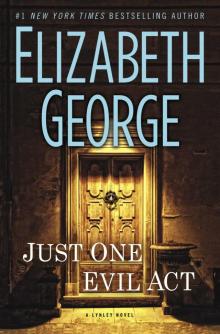 Just One Evil Act
Just One Evil Act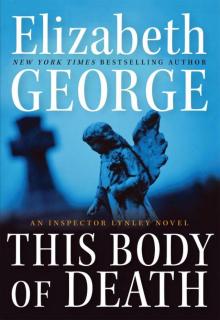 This Body of Death
This Body of Death The Edge of the Water
The Edge of the Water For the Sake of Elena
For the Sake of Elena Believing the Lie
Believing the Lie The Edge of the Shadows
The Edge of the Shadows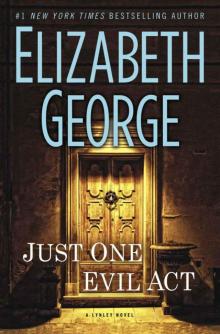 Just One Evil Act: A Lynley Novel
Just One Evil Act: A Lynley Novel In Pursuit of the Proper Sinner
In Pursuit of the Proper Sinner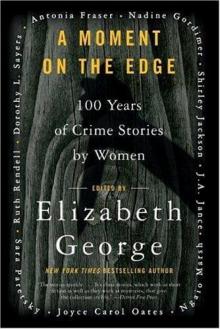 A Moment on the Edge:100 Years of Crime Stories by women
A Moment on the Edge:100 Years of Crime Stories by women Elizabeth I
Elizabeth I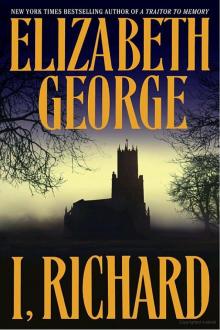 I, Richard
I, Richard A Traitor to Memory
A Traitor to Memory Missing Joseph
Missing Joseph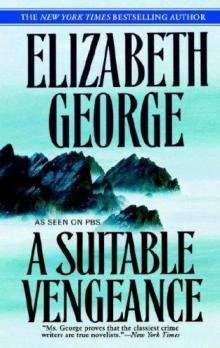 A Suitable Vengeance
A Suitable Vengeance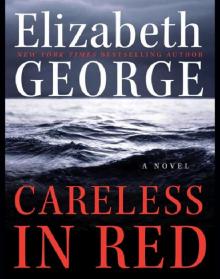 Careless in Red
Careless in Red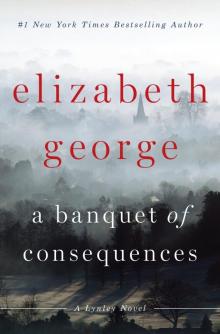 A Banquet of Consequences
A Banquet of Consequences Playing for the Ashes
Playing for the Ashes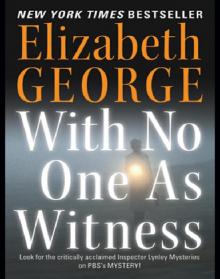 With No One As Witness
With No One As Witness Deception on His Mind
Deception on His Mind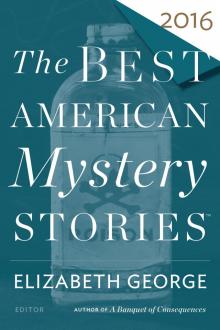 The Best American Mystery Stories 2016
The Best American Mystery Stories 2016 A Great Deliverance
A Great Deliverance In the Presence of the Enemy
In the Presence of the Enemy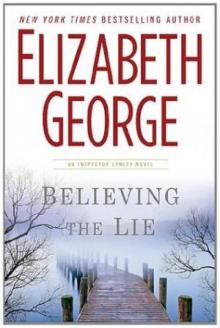 Believing the Lie il-17
Believing the Lie il-17 The Edge of the Light
The Edge of the Light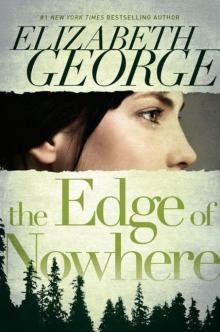 SW01 - The Edge of Nowhere
SW01 - The Edge of Nowhere A Place of Hiding
A Place of Hiding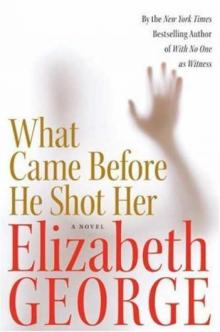 What Came Before He Shot Her il-14
What Came Before He Shot Her il-14 Payment In Blood
Payment In Blood The Punishment She Deserves
The Punishment She Deserves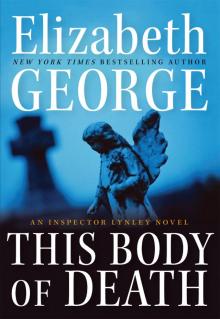 This Body of Death: An Inspector Lynley Novel
This Body of Death: An Inspector Lynley Novel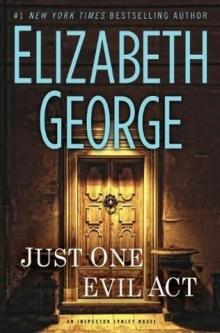 Just One Evil Act il-18
Just One Evil Act il-18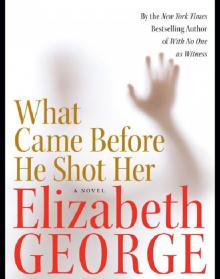 What Came Before He Shot Her
What Came Before He Shot Her Missing Joseph il-6
Missing Joseph il-6